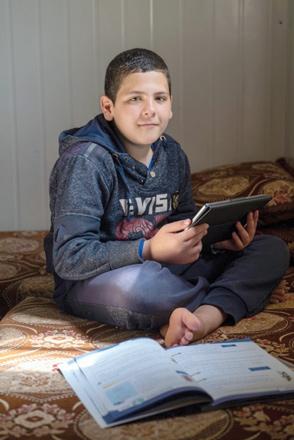You are here
UNICEF’s Makani programme supports national efforts in remote learning amid COVID pandemic
By Sarah Abu Zaid - May 04,2021 - Last updated at May 04,2021

UNICEF’s Makani Programme provides remote services for the most vulnerable children in Jordan through the provision of remote learning support services through the Makani Remote Services component (Photo courtesy of UNICEF)
AMMAN — UNICEF’s Makani Programme provides remote services for the most vulnerable children in Jordan through the provision of remote learning support services through the Makani Remote Services component.
The Makani (“My Space” in Arabic) programme provides an integrated package of services including educational learning support services, community-based child protection, early childhood development and skill-building training for children, young people, families and community members.
The closure of schools and the switch to remote learning has impacted 2.37 million children in Jordan. In March 2020, the government started broadcasting lessons on TV and established an online learning platform, Darsak, which provides free access to remote learning for all students in the Kingdom, UNICEF Jordan representative Tanya Chapuisat told The Jordan Times.
According to Chapuisat, the switch to digital education negatively impacted many vulnerable families who lacked the financial resources to provide their children with the necessary electronic devices leading to greater stress in the household and putting children’s learning at risk.
Chapuisat also noted that through Makani centres, UNICEF supports vulnerable children to continue their education, despite school closures. This includes referral to formal and non-formal education, as well as learning support and skill building.
“In 2020, UNICEF’s Makani programme reached over 155,000 vulnerable individuals, including over 119,000 children through a network of 141 Makani centres,” Chapuisat said.
UNICEF has been providing data packages to 20,000 households with school-aged children. More recently, UNICEF in partnership with KFW (the German Development Bank) and other donors, has distributed around 10,000 tablets to families with children in the Makani programme, Chapuisat added.
Chapuisat also noted that the most important component of the programme is that each child who receives a tablet is enrolled in the Makani Learning Support Services and as such, he/she receives individual learning support from a Makani Facilitator.
“Each tablet has pre-installed education applications and links to resources such as Darsak, Learning Bridges and Learning Passports,” she said.
Chapuisat added that UNICEF is able to upload additional resources through an MDM system that has been set up on each tablet, providing the opportunity to continually improve the available resources, as well as track usage and other analytics.
Crucially, the tablets enable children to connect with their teachers and Makani facilitators to support their continued learning while schools are closed. By using a tablet, children and adolescents are also developing digital literacy skills, which will be further supported through the skill building training offered by the Makani centres, Chapuisat noted.
Children expressed great excitement when they received their tablets, including Omar who was born in 2009, and now is in the seventh grade.
“I was thrilled when my dad brought us the new tablet, as I had to use a smartphone to study before, and now I am more excited to study using the new tablet. There used to be four of us who shared one smartphone and it was inconvenient to share, but now we divided ourselves so that the four of us can study at the same time since we have another way to access our online lessons,” Omar was quoted in a UNICEF statement as saying.
“I never used a tablet before, and I did not know what to do with it! But they are teaching us here how to use it and I am quickly learning,” Omar added.
Asmaa, a 10-year-old child, is one of 9,000 children attending UNICEF’s Makani centres who received tablets and Internet plans to help them continue learning from home during the pandemic.
“Before I received the tablet, I used my mother’s phone to study and I had to share it with my sister but now I use the tablet to do all my homework,” Asmaa said in the statement.
“I am nearsighted in one eye, the small screen of the smartphone used to give me headaches, it is much more comfortable now using the tablet,” she added.
Related Articles
AMMAN — Two years after the start of the COVID-19 pandemic, children from across the country are catching up on their studies with the UNICE
AMMAN — UNICEF has procured 45,000 locally manufactured warm winter clothing kits for vulnerable children, UNICEF Jordan Representative Tany
AMMAN — Swiss Ambassador to Jordan Hans-Peter Lenz, accompanied by UNICEF Deputy Representative to Jordan Ettie Higgins, visited a UNICEF su

















